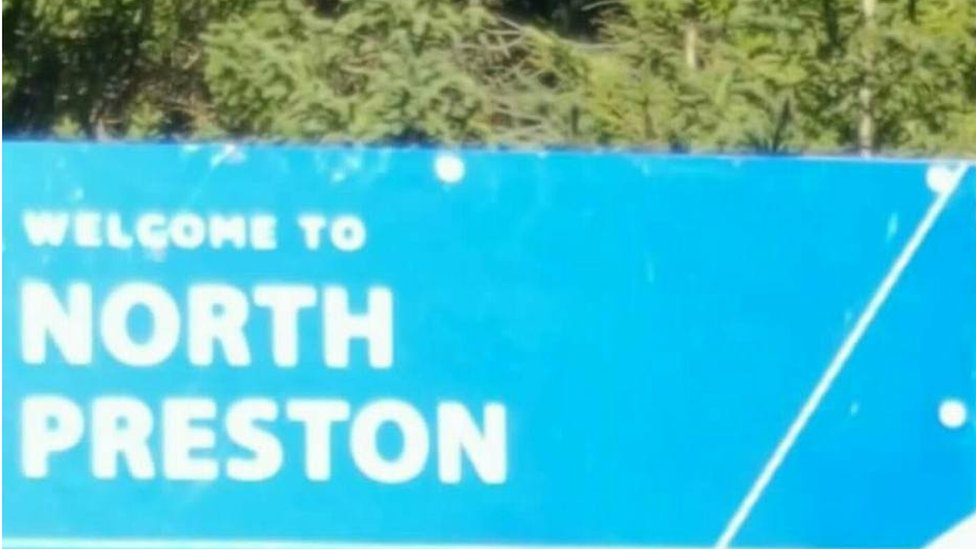
 Image copyright Courtesy North Preston’s Future
Image copyright Courtesy North Preston’s Future Canadian descendants of so-called Black Loyalists have long lived without title to the land they were given centuries ago. Now Nova Scotia is righting that historical injustice.
Violet Downey, 70, and her husband have lived on their land for 50 years. It’s been in her husband’s family for much, much longer.
The family live in North Preston, one of the oldest and largest black communities in Canada.
The land they live on may belong to the Downeys – but they don’t own it.
Like many families in historic black Nova Scotian communities, they don’t have legal title to land that has sometimes been in families for generations.
That means families who live and pay taxes on the land can’t legally will it to descendants, can’t sell it, can’t get a mortgage.
It’s a problem that dates back to the 1780s, the dying days of the American Revolution.
Black Loyalists were former slaves encouraged by the Crown to fight with British regiments against American forces, exchanging freedom in return for military service.
After the war, about 3,000 of them fled to Canada – then British North America – on the promise of “freedom and a farm”.
Their evacuation was compiled in the Book of Negroes, an official document that recorded names and descriptions of the black refugees who sailed from New York to Nova Scotia.
Most were given access to rocky, hardscrabble lots – often on the worst soil – in the maritime province of Nova Scotia.
But they weren’t given the ownership white settlers received.
In the decades that followed, they were joined by Jamaican Maroons – a group of freed slaves exiled from the island nation – and others escaping slavery through the Underground Railroad.
Some of the Nova Scotia communities they built are there today – places like North and East Preston, Cherry Brook, Lincolnville and Sunnyville.
But the lack of land titles has never been fully resolved.
In late September, Nova Scotia’s government took a step towards fixing the problem.
It announced C$2.7m ($2.2m;£1.6m) in funding over two years to assist five communities to get clear title to land on which they live, help cover the costs and handle the bureaucracy.
The money comes shortly after a UN report on anti-black racism in Canada urged the province to do more to resolve the issue.
Nova Scotia Barristers’ Society (NSBS) executive director Darrel Pink called the funding “really significant. It’s a big step”.
The NSBS began working on the issue in 2014 and has offered free help to residents who want to make a land claim.
Pink says he feels “somewhat embarrassed” that he initially didn’t know much about the issue.
“We didn’t appreciate how bad it was and how long it had gone completely unaddressed with literally no resources and virtually no progress being made,” he says.

Media playback is unsupported on your device
A 2015 multimedia project called “Untitled” by Nova Scotia journalism students also helped bring the issue to public attention, profiling the Downeys’ case and others.
The government doesn’t know how many residents plan to seek clarity of ownership, but an estimated 800 land parcels across the province could lack proper title.
It says some certificates of land have been granted but acknowledges communities “suffered from historical racial discrimination that prevented people from receiving legal title to the land they own”.
How has this problem languished for so long?
In 1963, the province passed the Land Titles Clarification Act, which was meant to lay out a simple process to assist people in obtaining title.
It was never properly implemented and residents have called the process unjust and discriminatory.
Some properties are caught up in ownership conflicts.
“Who lived here three generations ago? Who married whom? Who had a common-law relationship with whom? Who were the children of that relationship? These are the things that need to be addressed,” says Pink.
In some cases, up to five houses have been built on one lot without proper subdivision approval or land surveys, which has caused confusion around property taxes.
The properties need to be surveyed as part of the claims process, something that is often too expensive for poor residents.
“We’re generally talking about people who are indigent,” Pink says.
He adds the current legal framework doesn’t take into account cultural realities of those communities that “conflicted with dominant law”.
For example, few people in those communities write wills. There’s also a tradition of passing property on to the youngest – not the eldest – child.
Neville Provo, who has lived in North Preston for most of his life, describes it as “a tight knit community, a loving community”.
Provo, who volunteers with the North Preston Land Recovery Initiative, is cautious about celebrating the funding announcement.
“In the 1800s our people formed the same committee and fought for the same things,” he says, referring to North Preston residents who unsuccessfully petitioned Nova Scotia’s Lieutenant Governor in the 1840s asking that land titles be confirmed.
Provo says the lack a land titles creates uncertainty for both individual families and the community in the historically black suburb.
Communities around North and East Preston are surrounded by growing affluent neighbourhoods and are prime spots for development.
In the 1960s, the African Nova Scotian community of Africville was destroyed to make way for development. Former residents received an apology in from Halifax in 2010.
Over the phone, Violet Downey says: “I just hope and pray that we get our land in our own name. It would mean so much because we’ve been fighting for so long.
“I would love my children and their children to grow up and build houses around us.”
Note: This story is auto-generated from BBC syndicated feed and has not been edited by AFRICA PRIME NEWS